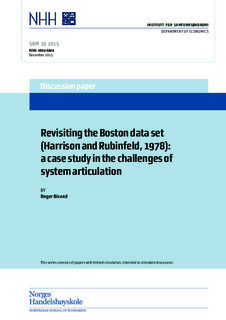| dc.contributor.author | Bivand, Roger | |
| dc.date.accessioned | 2015-12-18T11:14:01Z | |
| dc.date.available | 2015-12-18T11:14:01Z | |
| dc.date.issued | 2015-12-18 | |
| dc.identifier.issn | 0804-6824 | |
| dc.identifier.uri | http://hdl.handle.net/11250/2368481 | |
| dc.description.abstract | In the extended topical sphere of Regional Science, more scholars are addressing
empirical questions using spatial and spatio-temoral data. An emerging challenge
is to alert “new arrivals” to existing bodies of knowledge that can inform the ways
in which they structure their work. It is a particular matter of opportunity and
concern that most of the data used is secondary. This contribution is a brief review
of questions of system articulation and support, illuminated retrospectively by a
deconstruction of the Harrison and Rubinfeld (1978) Boston data set and hedonic
house value analysis used to elicit willingness to pay for clean air. | nb_NO |
| dc.language.iso | eng | nb_NO |
| dc.relation.ispartofseries | SAM;30/2015 | |
| dc.title | Revisiting the Boston data set (Harrison and Rubinfeld, 1978): a case study in the challenges of system articulation. | nb_NO |
| dc.type | Working paper | nb_NO |
| dc.subject.nsi | VDP::Social science: 200::Economics: 210 | nb_NO |
| dc.source.pagenumber | 17 | nb_NO |
